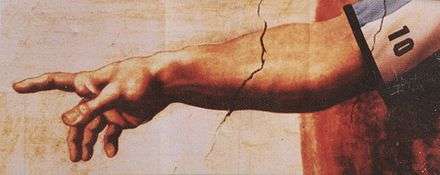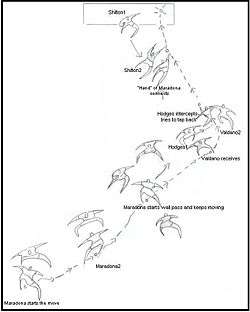The hand of God
"The hand of God" is a phrase used by Argentine footballer Diego Maradona to describe an association football goal he scored in a quarter-final match between Argentina and England during the 1986 FIFA World Cup. The goal took place on June 22, 1986, at the Azteca Stadium in Mexico City. Under association football rules, Maradona should have received a yellow card for a clear "handball" incident[1] and the goal disallowed. However, as the referees did not have a clear view of the play and video assistant referee technology did not yet exist, the goal stood and Argentina led 1-0. The game ended with a 2–1 win for the Argentines, thanks to a second goal scored by Maradona, known as the "Goal of the Century". After the match, Diego Maradona stated that the goal was scored "a little with his head, and a little with the hand of God".

The Goal

At the end of the first half, while the game was still tied at 0-0, Maradona was beginning to influence the end result of the match. Six minutes into the second half of the game, Maradona took the ball out of the box with his left leg and passed it to teammate Jorge Valdano. Valdano tried to take on several English defenders, but the ball was intercepted and thrown back and forth and eventually cleared towards England's goal by English defender Steve Hodge.
Because of the position of the players, Maradona would have been caught offside, but as the ball came off an opponent, he was onside. Alone inside the penalty box and with the ball dropping down, Maradona struggled for the ball alongside goalkeeper Peter Shilton, who stood 20 centimeters taller than Maradona. Shilton jumped forward with his right hand, while Maradona did so with his left arm outstretched. Maradona's fist, which was raised close to his head, touched the ball first and hit the ball into England's goal. Maradona began to celebrate while glancing sideways at the referee and the linesman for confirmation. He then fully celebrated the goal when it was given.
Tunisian referee Ali Bennaceur gave the goal, but after the English players' protests he sought the advice of his second linesman who confirmed the goal.
Mexican photographer Alejandro Ojeda Carbajal immortalized this moment in a photograph in which Maradona can be seen hitting the ball with his hand.
Now I can say what I couldn't at that moment, what I defined at that time as "The Hand of God". What a hand of God, it was the hand of Diego! And it was like stealing the English wallets too.
Ahora sí puedo contar lo que en aquel momento no podía, lo que en aquel momento definí como «La mano de Dios»... Qué mano de Dios, ¡fue la mano del Diego! Y fue como robarle la billetera a los ingleses también...— Diego Armando Maradona[2], Maradona
"History is already written"
In 2005, 19 years after scoring the controversial goal, Maradona confessed on a program La Noche del 10, that the goal was actually scored with his hand.
In early 2008, The Sun newspaper published an article in which they implied that Maradona, during a visit to England, had apologized for what is described as "the infamous goal of The Hand of God".
The newspaper first cites the phrase in this form:
"If I could go back and change history I would."
(«Si pudiera volver el tiempo atrás y cambiar la historia lo haría»)
but later repeats the same quotation by adding the word "apologize" which did not appear in the first one, although it is the same sentence:
"If I could apologize, go back and change history I would."
(«Si pudiera disculparme, volver el tiempo atrás y cambiar la historia lo haría»)
and then completes the idea:
"But the goal is still a goal, Argentina were proclaimed World Cup champions and I was the best player in the world. I cannot change the story. All I can do is move on."
(«Pero el gol sigue siendo un gol, Argentina se proclamó campeona del Mundial y yo fui el mejor jugador del mundo. No puedo cambiar la historia. Todo lo que puedo hacer es seguir adelante»).
Several world media outlets reported the news, creating controversy.[3] Even Peter Shilton rejected the apology, arguing that it was now too late.[4] Maradona, a few days after the article came out, denied everything, saying that the newspaper had misquoted him. Maradona responded:
"I never spoke of forgiveness. I said only that the story could not be changed, that I do not have to apologize to anyone, because it was a football game in which there were 100,000 people in the Azteca stadium, twenty-two players, that there were two linesmen, that there was one referee, that Shilton (the goalkeeper) speaks up now and he hadn't noticed, the defenders had to tell him. So the story is already written, nothing can change it. And that was what I said. I never apologized to anyone. Besides, I don't have to apologize by making a statement to England. For what? To please who? What pisses me off the most is that they repeat this in Argentina and talk to people who know me. They talk about contradictions. At forty-seven I think that apologizing to the English is stupid."
(«Yo en ningún momento hablé de perdón. Hablé solamente de que la historia no se podía cambiar, de que yo no tengo por qué pedirle disculpas a nadie, porque fue un partido de fútbol en el que había cien mil personas en el Azteca, veintidós jugadores, que había dos líneas, que había un árbitro, que Shilton «el arquerazo ese» sale a hablar ahora y él no se había dado cuenta, se lo tuvieron que decir los defensores. Así que la historia ya está escrita, ya no la puede cambiar nada ni nadie. Y eso fue lo que dije. Yo nunca le pedí perdón absolutamente a nadie. Aparte no tengo que pedir perdón yendo a hacer una nota a Inglaterra. ¿Para qué? ¿Para ganarme a quién? Lo que más me jode es que se hacen eco en Argentina y hacen hablar a... gente que me conoce. Hablan de contradicciones. A los cuarenta y siete años me parece que pedirles disculpas a los ingleses es una estupidez.»)[5]
A few days later, The Sun newspaper confirmed that it had modified the interpretation of Maradona's words and asked to change the name to The Devil's Hand. In the original text of the interview, it could be seen that Maradona had never asked for forgiveness for the goal from the Hand of God.
Falklands War and "symbolic revenge"
In the 2019 documentary film directed by Asif Kapadia, Maradona links the event to the Falklands War four years earlier: "We, as Argentinians, didn't know what the military was up to. They told us that we were winning the war. But in reality, England was winning 20-0. It was tough. The hype made it seem like we were going to play out another war. I knew it was my hand. It wasn't my plan but the action happened so fast that the linesman didn't see me putting my hand in. The referee looked at me and he said: 'Goal.' It was a nice feeling like some sort of symbolic revenge against the English."[6]
Subsequent use
The "Hand of God" became a popular phrase and reference to it is still made around the world. Here are some other famous football handballs; In the first round of the 1990 World Cup between Argentina and the USSR, in the first half of the 0–0 draw, a Soviet attack failed as Maradona intercepted the shot with "the hand of God" without the referee noticing.[7]
During the final minutes of the second leg of the play-off for the 2010 World Cup between Ireland and France, William Gallas scored the decisive goal from a Thierry Henry assist that gave France a 2-1 aggregate victory and qualified them for the World Cup. Controversy followed immediately as replays were showing Henry repeatedly centering the ball with his hands moments prior to passing the ball to Gallas. Despite protests from the Irish side, Swedish referee Martin Hansson did not admonish Henry and allowed the goal. After the match ended, sporting news industries from around the world gave Henry's cross several nicknames, ranging from "The New Hand of God",[8] to the more scathing "The Hand of Frog", the latter using an insulting term towards French people.[9]
Uruguayan footballer Luis Suárez illegally stopped with his hand a likely goal from Ghanaian Dominic Adiyiah in the quarter-finals of the 2010 FIFA World Cup. At the subsequent press conference, the striker said he had done so with the "Hand of God".[10]
On February 11, 2020, in Group G of the 2020 AFC Cup, Joshua Grommen of Ceres-Negros F.C. scored the second goal of their game against Preah Khan Reach Svay Rieng FC by diverting the ball into the net with his hand. Despite vocal protests from the opposing side, the goal was given as officials had failed to notice the blatant handball.[11]
See also
References
- Understanding The Hand Ball Rule. Medium. Retrieved 10 January 2020
- Yo soy el Diego, de Diego Armando Maradona. 2000, Editorial Planeta. Pág. 32. ISBN 84-08-03674-2.
- [es:El Mercurio], Maradona pide perdón por la "Mano de Dios"
- [es: La Tercera], Peter Shilton rechazó las disculpas de Maradona
- “Maradona dijo que no se disculpó a los ingleses”. Clarín. Retrieved 10 January 2020
- Dawnay, Oliver (6 June 2019). "Argentina legend Diego Maradona says 'Hand of God' goal against England was 'symbolic revenge' for the Falklands War". Talksport. Retrieved 19 January 2020.
- "13 June 1990: Diego Maradona's other World Cup handball". The Guardian. Retrieved 3 February 2015
- "La mano de Henry lleva a Francia al Mundial". elmundo.es deportes.
- "Ireland outraged after French handball nixes World Cup hopes". CNN. Retrieved 10 January 2020.
- "World Cup 2010: The Hand of God belongs to me, says Luis Suárez". The Guardian. 3 July 2010. Retrieved 3 July 2017.
- "Hand of God: Maradona-style handball goal goes unnoticed in AFC Cup – video". The Guardian. 12 February 2020.
External links
- "Top 10 Famous Soccer Handballs". HowTheyPlay. Retrieved 2019-11-22.